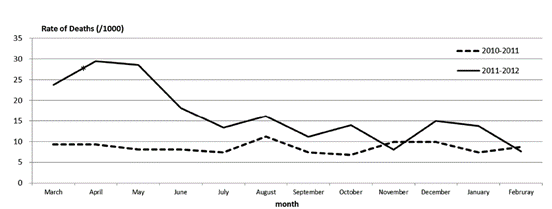Sociological impacts
A serious complication is the finding that in previous nuclear accidents the most deleterious impact on the populations were not due to the radiation itself but to the financial, social and psychological impacts of the enforced protective actions and their aftermath on the over-all life-satisfaction of those affected.
After the Fukushima Dai-ichi radiological accident the authorities advised evacuation out to up to 50¬miles from the site even though shelter-in-place might have been more appropriate. It has been claimed that (Igoe, 2018 - Radiological Accidents: The Surprising Physiological and Sociological Impacts "The sociological impacts can kill people …. suicides, domestic abuse, depression and alcoholism all went up immediately after the event. In analysis of the death rates, as many as 1,600 people may have died as a direct or indirect result of the evacuation". Elsewhere (WNA, 2021b) -Fukushima Daiichi Accident it is claimed that "the premature disaster-related deaths were mainly related to (i) physical and mental illness brought about by having to reside in shelters and the trauma of being forced to move from care settings and homes; and (ii) delays in obtaining needed medical support because of the enormous destruction caused by the earthquake and Tsunami”.
 Change in mortality rates among the institutionalised elderly who were in the evacuation zone (1,770 individuals across 34 facilities) showing data for the year
before and the year after the Fukushima NPP accident. (S Yasumura, 2013)
Change in mortality rates among the institutionalised elderly who were in the evacuation zone (1,770 individuals across 34 facilities) showing data for the year
before and the year after the Fukushima NPP accident. (S Yasumura, 2013)
It is not clear from reading the reports if this study is based on people who returned home after a period or remained in alternative accommodation.
There have also been reports of “radiation stigma” following the atomic bombs on Hiroshima and Nagasaki and the accidents at Chernobyl and Fukushima. This is a complex concept based on the loss of self-confidence and resilience in those exposed and rejection of them by their society based on fears of radiation, fears of radiation induced ill health (particularly mental health and reproductive health) and dependency.
A presentation made at an IAEA conference (IAEA, 2013) suggested that not clearly answering the types of questions such as “is my baby safe?” to pregnant women has resulted in:
- Voluntary abortions;
- Unsafe evacuation of patients (deaths);
- Refusal to treat patients;
- Stigma;
- Economic impact;
- Psychological distress.
It is clearly important to communicate well!
It is important to combat the social and physiological impacts likely to arise from a major radiation accident. This involves getting the protective action strategy and advice balanced, looking after displaced and disturbed people well and combating misinformation and misunderstanding within those affected and those around the affected people. Prior information is where this process starts.